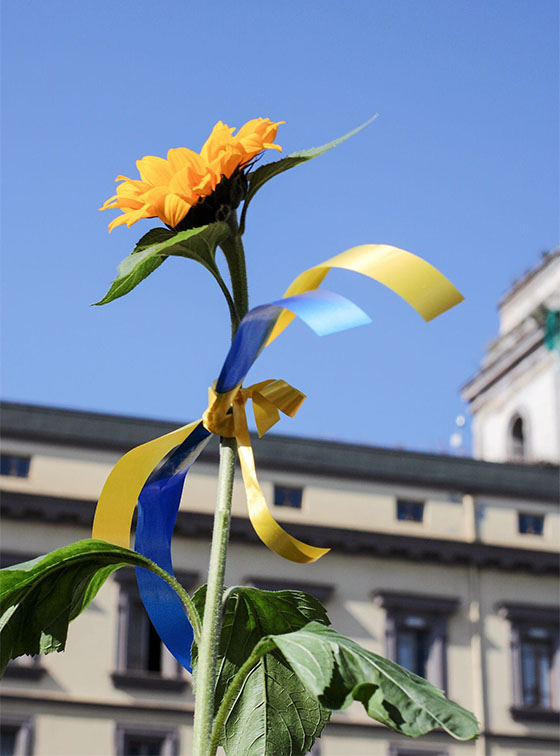University of Insubria – Centre for Research on Minorities and University of New Europe (UNE) Winter School

Memories of war and violence occupy a special place in our societies. They inspire moral imperatives aiming to prevent future atrocities and to demonstrate the importance of sustaining peace. However, memories of past conflicts can also incite hate and be used to justify violence. The ongoing Russian-Ukrainian war, framed by the Kremlin as the continuation of the WWII-time crusade against Nazism, provides a tragic opportunity to engage not only with the (ab)uses of memory but also with the immediate experience of living through and
witnessing a war.
The ambiguous role of memory in the context of armed conflicts raises multiple questions, relevant both for the academic community and the civil society: How do individuals and societies in Europe and worldwide remember wars and violence? What are the differences in war-related memory practices across societies and how are they affected by the rise of digital technologies? What methodological and conceptual approaches can be used to study war memories and their societal functions, including the ones associated with the present conflicts such as the Russian war against Ukraine?
To address these questions, the Winter School “How to Document the Present: Oral History and Memory of the War” will bring together a cohort of esteemed scholars specialising in research dealing with the complex interrelations between memory, violence, and war. A unique transdisciplinary environment will provide students with possibilities to learn different conceptual stances on memory and war, but also to get familiar with a broad range of methodological approaches to study them, ranging from classic qualitative approaches (e.g., close reading or content analysis) to novel computational approaches (e.g., topic modelling and algorithm audit).
In addition to learning the state-of-the-art theoretical and methodological approaches for studying the interrelationship between oral history, memory, and war, participants will engage with the latest research on the memories of violence and war in the context of Ukraine. For this aim, the school will bring together a group of Ukrainian and Western scholars who will discuss their oral history projects with the School’s participants. Besides providing unique education experience and networking opportunities for students, such engagement will facilitate critical reflection and dialogue which are core principles of the University of New Europe (UNE).
Location
Classes will be held at the S. Abbondio campus of the University of Insubria (Via S. Abbondio 12) in Como, Italy. Located next to the Italian-Swiss border, the city of Como overlooks the southwest end of Como lake and is surrounded by green hills, forested mountains and blue, crystal clear water.
Credits
Participants completing the school are entitled to receive 5 ECTS.
Program
The school will consist of five days of lectures, methodological seminars, and group-based research exercises. These educational activities will be clustered together in five thematic components constituting the basis of the programme. The description of the components is provided below and also includes selected examples of classes to be taught within different components. The full program can be downloaded here or below.
Introduction to the research on cultural memory and oral history of war and violence. This component will consist of introductory lectures dealing with key concepts (e.g., genocide, trauma, and memory) related to cultural memory and oral history of war and the ways these concepts can be used, but also misused in academic research. Component sneak peek: Alexander Etkind (Central European University): The concept of the genocide and its uses today.
Oral history and cultural memory of war across disciplines. The component will offer an overview of theoretical and methodological perspectives on oral history and cultural memory of war and violence coming from different academic disciplines such as history, psychology, language education, and security studies. Component sneak peek: Daniele Brigadoi Cologna (University of Insubria): Lost memories of war: piecing together the evidence of mass internment of Chinese citizens in Fascist Italy during WWII.
Oral history and cultural memory of war in the digital age. The aim of this component is to provide an overview of methodological approaches for studying oral history and cultural memory of war in online environments, including qualitative (e.g. close reading), quantitative (e.g. automated text analysis) and mixed-method (e.g. algorithm audit) methods. Component sneak peek: Aleksandra Urman (University of Zurich): Using machine learning for studying oral history and cultural memory.
Oral history and cultural memory of war and violence in Ukraine. This component will be focused on the theoretical and methodological lessons learned by the Ukrainian scholars from their experiences of applying oral history for studying both historical and ongoing violence in Ukraine. Component sneak peek: Svitlana Teluha (Karazin Kharkiv National University): Holocaust in the voices of those who survived.
Oral history and cultural memory research practice. This component will let students apply knowledge and skills they acquired to implement short projects on using oral history for studying the ongoing war in Ukraine and then receive feedback from the school’s faculty. Component sneak peek: Group-based oral history practice (students and faculty)
Advisory Board
Jan Claas Behrends (Viadrina University / ZZF / UNE), Alexander Etkind (CEU / UNE), Dina Gusejnova (LSE / UNE), Andrea Peto (CEU / UNE), Ellen Rutten (University of Amsterdam), Philipp Schmaedeke (University of Applied Sciences), Mykola Makhortykh (University of Bern / UNE), Daniele Brigadoi Cologna (University of Insubria), Paola Bocale (University of Insubria), Aleksandra Urman (University of Zurich), Luciano Mecacci (Academia Europaea).
Faculty
The school’s faculty consists of 12 scholars with diverse disciplinary backgrounds and working in different parts of Europe, including Alexander Etkind (Central European University), Paola Bocale (University of Insubria), Elizaveta Gaufman (University of Groningen), Svitlana Teluha (Karazin Kharkiv National University), and Mykola Makhortykh (University of Bern).
Contact
Sponsors
The Winter School is organized with the financial support of the Leibniz Centre for Contemporary History Potsdam.
